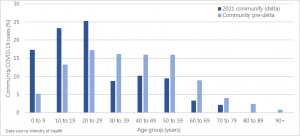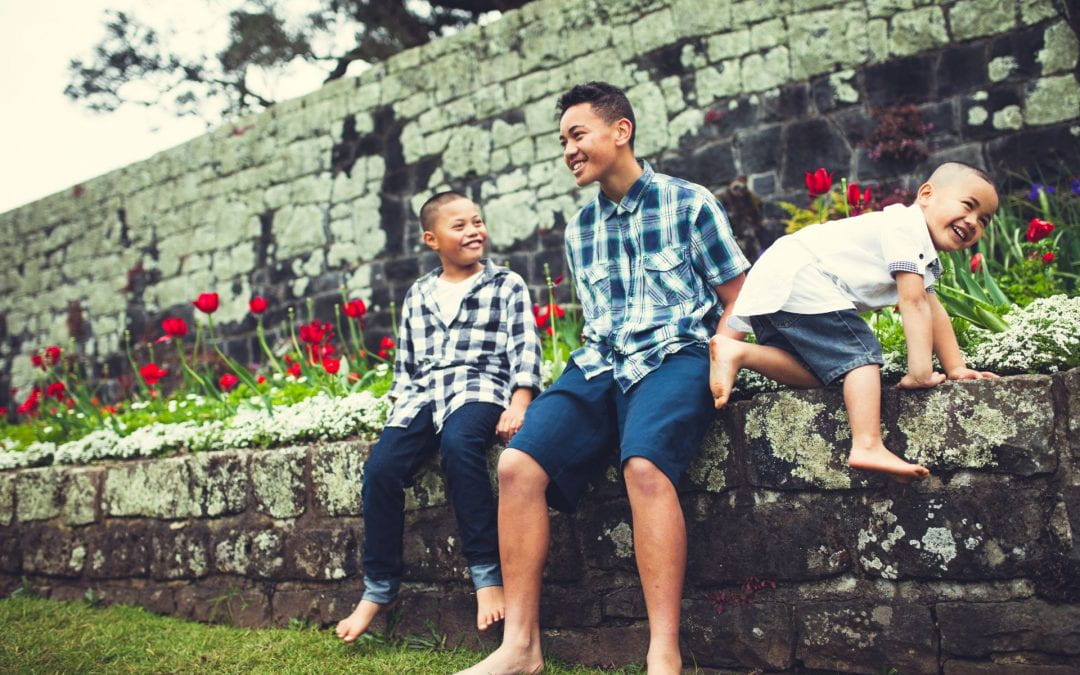by Dr Mavis Duncanson, Director of the NZ Child and Youth Epidemiology Service
Early in 2020 the United Nations signalled that children may experience poor health outcomes as a result of the Covid-19 pandemic.
Harmful effects were expected to fall more strongly on children already living in neighbourhoods or circumstances marked by limited resources, racism and discrimination. Effects of the pandemic response – including economic downturns, increased poverty rates, school closures and reduced or delayed access to health care – were expected to be associated with greater harm than direct infection.
A small proportion of children with Covid-19 have developed severe illness and some have died. A recent modelling study published in the Lancet estimated that globally 1.5 million children experienced the death of at least one parent or caregiver during the pandemic. In nine countries, including the USA, this was estimated to be the experience of at least one in every 1000 children.
The Delta variant that emerged in late 2020 is more infectious and passes more readily between people. It is now the predominant form of the virus in many parts of the world.
The effective pandemic response in Aotearoa means that there were no community cases between 22 April and 16 August 2021, with the first case detected in the Delta outbreak on August 17 this year. This means that we can compare the patterns of infection before and after Delta.
Ministry of Health data shows that the Delta variant has been affecting younger people more than the variants earlier in the pandemic (Figure 1). Two-thirds of cases in the 2021 Delta outbreak were aged under 30 years. In contrast, almost half of the earlier community cases were aged 40 years or older. Up until April only 5% of cases were aged under 9 years. This has increased to 17% in the Delta outbreak, with 253 cases aged under 12 years and 13 aged under one year.
Over two-thirds of overall cases in the Delta outbreak have been of Pacific Peoples, and 15% of Māori, although breakdown of ethnicity by age is not publicly available. Over the whole pandemic 11 people aged under 20 years have been hospitalised with Covid-19 and one required intensive care (ICU data have not been updated since June).
During the Delta outbreaks in Sydney and in Auckland, a new phenomenon has emerged of children with Covid-19 needing hospitalisation because of severe illness in their parents or caregivers. While not technically orphans, this does reinforce the multigenerational effects of infection.

Figure 1. Community cases of Covid-19 by timing in relation to Delta variant and by age group, Aotearoa, as at 22 September 2021.
With vaccinations now available to all New Zealanders aged 12 years and older, this leaves the youngest age groups susceptible to infection.
Much of the spread in the Delta outbreak in Aotearoa has been within households. Teachers can be adult sources of infection in schools. Until there is an approved vaccine for younger children (which may not be far off), our best collective action is to achieve well over 90% vaccination rates in the eligible population.
Initial vaccine rollout was less accessible to Māori whānau and to Pacific Peoples. As noted by Associate Professor Collin Tukuitonga, well-resourced community-led programmes will be essential to reach population immunity. The wisdom and advice of Te Rōpū Whakakaupapa Urutā and the Pasifika Medical Association, among others, will be essential to achieving this outcome.
References
- United Nations Sustainable Development Group. 2020. The impact of COVID-19 on children. United Nations. https://unsdg.un.org/resources/policy-brief-impact-covid-19-children
- Hillis SD, Unwin HJT, Chen Y, et al. 2021. Global minimum estimates of children affected by COVID-19-associated orphanhood and deaths of caregivers: a modelling study. The Lancet, 398(10298) 391-402. https://www.thelancet.com/journals/lancet/article/PIIS0140-6736(21)01253-8/fulltext
- Centers for Disease Control and Prevention. 2021. Delta variant: what we know about the science. https://www.cdc.gov/coronavirus/2019-ncov/variants/delta-variant.html
- Ministry of Health. 2021. COVID-19: Case demographics. https://www.health.govt.nz/our-work/diseases-and-conditions/covid-19-novel-coronavirus/covid-19-data-and-statistics/covid-19-case-demographics
- Tukuitonga C. 2021. New Zealand cannot abandon its COVID elimination strategy while Māori and Pasifika vaccination rates are too low. https://theconversation.com/new-zealand-cannot-abandon-its-covid-elimination-strategy-while-maori-and-pasifika-vaccination-rates-are-too-low-168278

